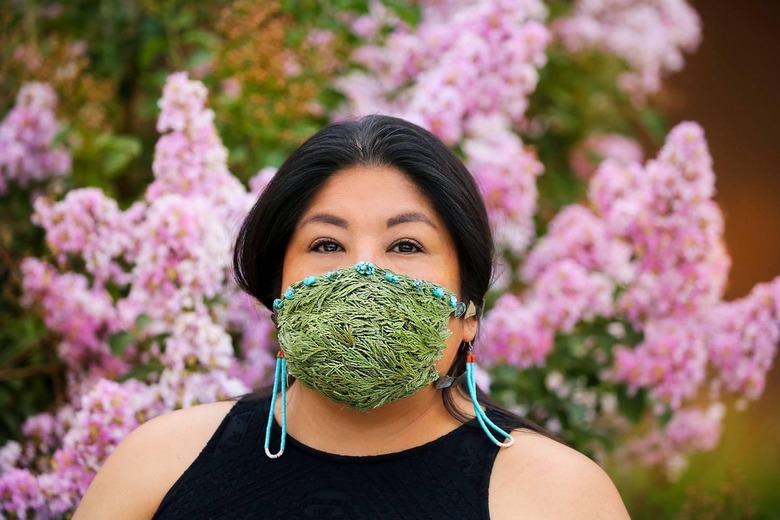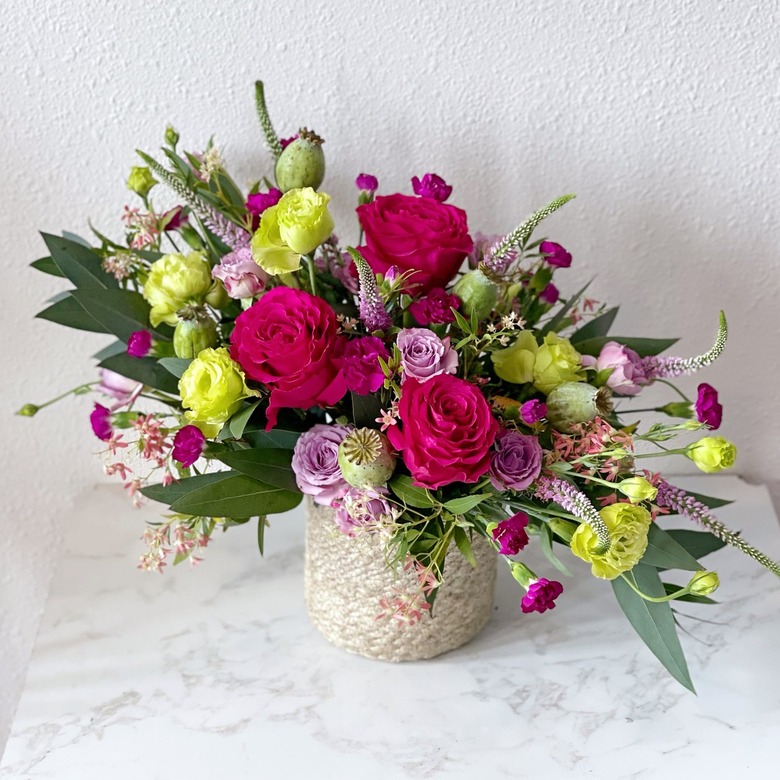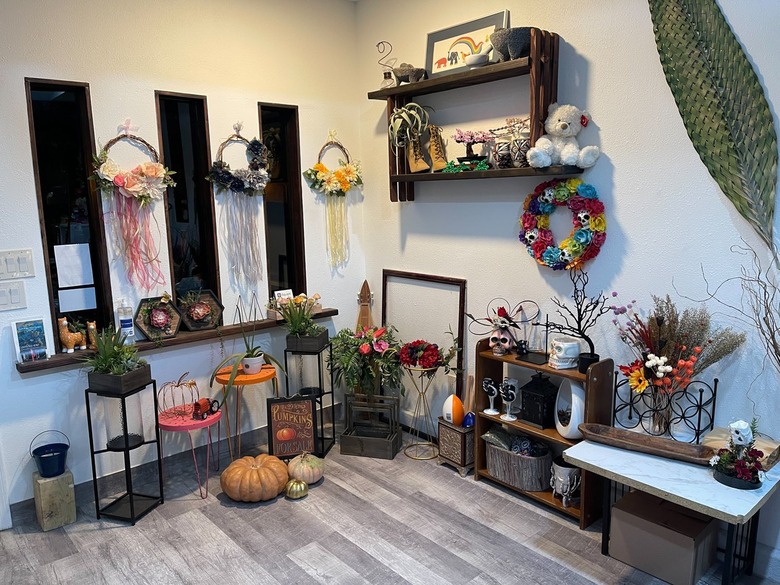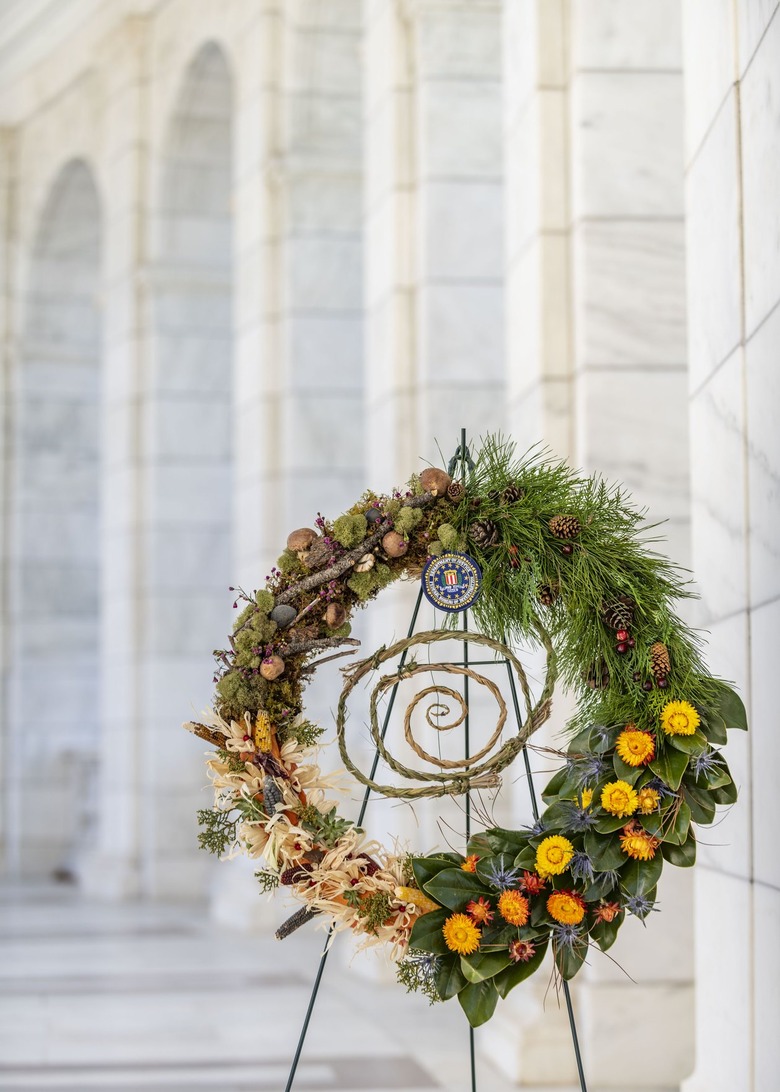Native American Florist Shayai Lucero Combines Floristry With Tradition
Some creative people come to their craft in unexpected ways, and that's certainly the case for Shayai Lucero. Scholarship issues, and later a pregnancy, complicated what she thought would be a straightforward path to becoming a doctor.
A little more than a decade ago, Lucero obtained her biology degree but realized she needed to change course. None of the jobs she was applying for would allow her to breastfeed on site and she wanted to spend as much time as she could with her newborn. So she took a risk, buying a Laguna, New Mexico-based floral business in 2008 that included a resident shop florist.
That employee, however, soon went on maternity leave. And Lucero found herself suddenly in the midst of learning all the floral knowledge she could. Now, Earth & Sky Floral is a fixture in the community and every arrangement is made with a careful consideration of the person and the occasion, with traditional prayer and intentional design. The shop's team consists of Lucero and designer LaDeen Roughsurface.
Lucero grew up in the reservations of the Acoma and Laguna Pueblos, and she was no stranger to creativity. In fact, her grandmother, Lucy M. Lewis, played an instrumental role in carrying on the Pueblo pottery tradition. As a teenager, Lucero wondered if she, too, could work in the medium.
"She helped revitalize the old styles of traditional pottery making and became very well known for her designs, and I even sat down with her," Lucero tells Hunker. "She told me, 'Granddaughter, you're not good at this.' I was like, 'Good, thank you for being honest with me ... I really wanted to do pottery but she [said], 'The clay doesn't talk to you.'"
Around that same time, Lucero started gravitating towards medicinal plants. For an eighth-grade science fair, her project identified and catalogued this knowledge.
"I come from a very traditional Pueblo family," Lucero says. "We use a lot of the plants every day in our cooking, when we're sick, for meals, [and] as food."
That interest led her to pursue a career as a doctor. People in the community would often ask for her advice, coming up to her at the grocery store and telling her their symptoms. She'd recommend a plant they could use as a tea or a foot soak for their sickness. Lucero continued expanding this knowledge by taking a Curanderismo class, which highlighted traditional Mexican healing knowledge. Paired with her Pueblo expertise, this became the foundation for the florist's work.
Curanderismo, for example, taught her about the practice of sitting down with someone to learn about their body's needs in a holistic manner. She does the same with each floral arrangement, taking care to speak with each person in order to create "floral life tributes for [her] customers to honor their loved ones."
"I just try to incorporate those Pueblo teachings that I grew up with in how I create my floral art," Lucero says.
But it hasn't always been easy. In floral design competitions, Lucero started noticing she got high scores in some areas but still was being passed over for awards. Looking at her score card during one event, she realized she was being penalized for one specific detail.
"I work a lot with even numbers," Lucero says. "In floristry, a lot of it is odd numbers or in numbers of three ... But in Pueblo culture, we do numbers in evens. At that point, I didn't even realize what I was doing. It was just kind of an innate part of me. And so I haven't stopped. I keep doing it."
The same goes for the commissions she takes. Lucero says she's noticed that she's isolated herself from the wedding industry, in a sense — because she refuses to take on culturally appropriative projects.
"I'm working hard to educate the international floral industry. I am the less than 1%," Lucero says. "There's not very many Indigenous or Native American florists in our industry, and it's really hard to educate so that parts of our culture are not appropriated. I've denied people decorating their macramé tipis or I've even refused to do a wedding where a non-Native couple was getting married in a tipi ... I won't make dreamcatchers with flowers."
Lucero's shop has become an important part of the community, with members calling her for a range of reasons. Every time she approaches an arrangement, Lucero also makes sure that her thoughts are positive and loving — so that the pieces might take on that energy. She often incorporates high desert plants and is intentional in how she sources her materials.
"I don't just gather plants from the hills without an offering of cornmeal or water — and thanking the plants for shortening their life to become this floral design," Lucero says.
One of the recent projects that Lucero holds close is a wreath that she was commissioned to create by the Federal Bureau of Investigation (FBI). It was placed near the Tomb of the Unknown Solider in the Arlington National Cemetery. Lucero designed each quadrant of the piece to symbolize different tribes.
She explains that the upper right quadrant, with elements like pine cones and cranberries, represented the Northeast tribes. The lower right highlighted the Southeast tribes, with plants like magnolia leaf and thistle. The lower left paid homage to Southwest tribes through corn husk flowers and succulents, while the upper left recognized Northwest and Alaskan tribes in its use of moss, rocks, and ivory.
"All these different people, friends and family across the U.S., were sending me items to put into this," Lucero says. "Because for Native Americans, we've been involved in every conflict that the United States has been in ... even my own father was a Vietnam veteran. So the honor to be able to create the Native Warriors Wreath for the men and women who are making their final rest in Arlington — and then for the Unknown — it was just a huge honor to be able to be a part of that."
She hopes that her work paves the way for other Native florists. And she often thinks back to those first few experiments in clay.
Lucero says that, today, she might tell her Grandma: "Now, I can talk to the flowers. It's just a different medium."



